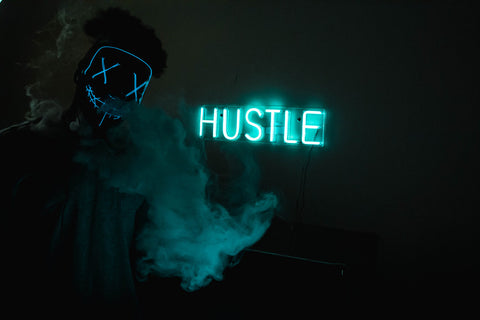
"What have you been up to? Any cool bands you're working with? What sort of gigs have you been doing this summer?"
The most dreaded questions ever! (Pretty much just never ask them to anyone on a gig, ever.)
"Well," I answered, "I've been writing and producing a comedy show and training for some elevation hikes I have later this summer."
It was a very less than expected answer. But the truth was I hadn't had a lot of gigs and it was something I was a little depressed about. I'd also been recovering from a car accident I'd had earlier that year where I took impact into my rotator cuff. My practice time had been largely replaced with physical therapy and doctor visits and the hours with my instrument consisted of painful maintenance scales and the occasional gig.
It wasn't a particularly pleasant time in our relationship for me and my cello.
When you have been training your entire life at something, something you're good at, something you love, something that is inherently internal and a part of your very being, when you feel that strongly linked to something and you physically cannot do it, it's a beyond horrible feeling.
It's crippling.
Finding out who you are away from your instrument is a daunting task. It's even harder when it's by force through injury or pain.
Six years ago, I was seeing a therapist once a week. It wasn't cheap but I'd found myself at a wall in life. I had a small bank account, an emotionally draining job on a tv show where I felt that my personal life and pain was being buried to put on a happy face for the camera, and I had
a complete inability to trust anyone after a roommate had stolen from me and stopped paying rent forcing our eviction. I'd been in physically therapy to rehab a back seizure and my physical and emotional stress were very high.
Then I started improv comedy and a new addiction was born!

This was a world where my ability as a cellist didn't matter. I made new friends, I performed in silly shows, I wrote sketches and I even stopped going therapy!
I discovered in improv that I could say anything and be anyone. We were all starting at the beginning together. Every issue I had with trust, the undue pressure of perfection, the physical hurt of playing, the frustration with my finances, family, relationships, and all my fears were verbalized, processed and taken in by a listening scene partner and audience who thought they were just listening to a southern bumpkin with aspirations for college and no money to pay for it. The beauty of improv is saying your truth through whatever character you've created. Sometimes you're making up a backstory and sometimes you're telling your own.
(Above: Sketch show performance of "French Dinosaur" at Second City.)
I've been improvising now around five years. I've written and produced two shows, graduated from the improv/sketch conservatory at Second City and the improv program at iO West. I've played on long form and short form house teams, produced web series and filmed sketches, I've booked commercials based off characters and improv and collaborated with clowning duos, idiot workshops, teachers, kids and friends.
 I've developed a hobby and I love it! At no point in time did anyone pay me to improvise. It's a path I've gone down by choice and because of love. And during the times in my life when injury has kept me from the music I love, improv has carried me through. Your hobby doesn't have to be my hobby. Your hobby can be anything. Painting, photography, a recreational sports team, taking a bartending course or a cooking class, joining a book club. The options are limitless but being well-rounded doesn't stop once you've gotten your college acceptance letter. Being well-rounded enhances your playing by enhancing your life.
I've developed a hobby and I love it! At no point in time did anyone pay me to improvise. It's a path I've gone down by choice and because of love. And during the times in my life when injury has kept me from the music I love, improv has carried me through. Your hobby doesn't have to be my hobby. Your hobby can be anything. Painting, photography, a recreational sports team, taking a bartending course or a cooking class, joining a book club. The options are limitless but being well-rounded doesn't stop once you've gotten your college acceptance letter. Being well-rounded enhances your playing by enhancing your life.
(Above Right: Diversity in Comedy Festival performer/producer for #ThisIsAProtest)
For many of us, music is our livelihood and our hobby. It's our greatest joy but when that joy is diminished with physical or mental pain or the routine or the feeling of pressure from perfection and finances, it's a relief to have friendships and places to play and relax outside of the world of music!
If you're a little stuck where to start here are a few tips:
Find a hobby that's meditative.
Since 2005 Stitchlinks has been pioneering research into the benefits of therapeutic knitting. They've found that any activity that engages in a flow-like state of being helps us enter a meditative mind-set allowing our brains to roam.
Find a hobby where you're intrinsically motivated.
It's a big word but it just means "something you enjoy". Maybe when you were little you really enjoyed creative writing but you lost the opportunity to pursue it further while on your music scholarship. It's not too late! If you are intrinsically motivated to do something, the likelihood that you will continue increases as well as your ability to think creatively in problem solving.
Find a hobby that fits your personality.
I'm a bit of a wallflower. Approaching groups of people gives me anxiety as do social mixers or anywhere that I have to be the center of attention when I'm not seeking it out. Put me on a stage and the alter-ego comes out! Put me in a bar and ask me to meet three new people and I'm frozen. Knowing if you're an introvert or an extrovert can be of great help. Join a sports team where conversation in the game and at practices is minimal and then take the seeds of your shared experience and use a post-game meal to expand your social circle.
Find a hobby that's physical.
One of my largest battles with music is the lack of tangible evidence for the hours I've spent with my instrument. Yes, a passage of music improves or a recording comes into existence or a performance occurs, but there's nothing I can see and latch onto. So I started volunteering in a garden. The physical work helped me to feel connected to a process and the flowering blossoms and tasty vegetables I harvested gave me a sense of accomplishment.
Find a hobby you're a little scared of.
When we begin a new pursuit, we're usually starting over at square one. If I sign up for beginning pottery, everyone in the class should be a beginning potter. The fear or the unknown is shared. The lack of skill-set is shared. The knowledge that what I make is not going to be of professional quality is shared. I can leave the class feeling a boost of confidence knowing I tackled my fear and survived.
If you're still a little stuck, here are some resources I've used to help me find hobbies:
With locations all over the world, chances are you can find what you're interested in here.
Meetup brought me to my running club and we just celebrated our ten year anniversary. I've been in this group for six of those years and, since I never have a permanent place of employment or consistency in co-workers, I can now say that it is the longest and most consistent activity in my life. The friends I have made in this group have become my travel partners, my happy hour friends, my neighbors and life-long relationships based on a shared location and activity.
Before I discovered improv I found myself longing to be plugged into a community through volunteer work. I began helping in a garden located at an elementary school in south LA. The garden ran primarily on interns and volunteers and taught kids and families about healthy eating and gardening. Once a week for a year and a half I showed up and pulled weeds, watered plants, harvested vegetables, and built garden beds. It was hard work but one of the most rewarding experiences I've had.
And of course, I'd never miss a chance to plug improv! In LA, you can enroll in classes at Second City, the Clubhouse, Westside Comedy, the Groundlings, the Pack, UCB and more in the Los Angeles area. If you're in a different city, look it up or ask me and I'll help you find a place! I have loved the emails and messages I've been receiving from everyone and am happy to answer and encourage you in any way I can.
If you're feeling brave, leave a comment directly on the posts or on the Instagram. Together we're able to build a community where physical and mental pain aren't something to be ashamed of but a place where we can encourage one another by admitting we've been there too. This week I'll have an interview with Dr. Sum, a physical therapist in the Musician Rehabilitation program at the University of Southern California (USC) who has worked with professional athletes and musicians so please be on the lookout for our conversation and blog post.
Remember, physical or mental pain should never limit our art or our joy so learn how to train like an athlete to play like a musician.
Health and happiness,
Karen








A very informative zodiac blog with creative and engaging content.
https://hobiapaaja01.wordpress.com